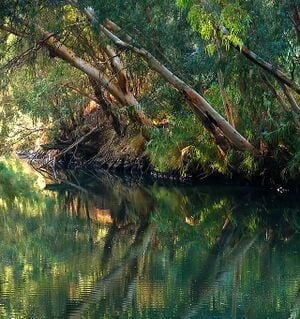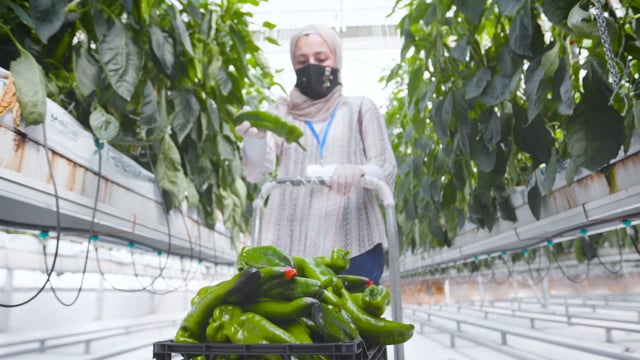
 The farm that grows vegetables in the middle of the desert, positive.news (Jul 19, 2023)
The farm that grows vegetables in the middle of the desert, positive.news (Jul 19, 2023)  Jordan’s Bedouins take on the struggles of climate change, aljazeera.com (May 26, 2023)
Jordan’s Bedouins take on the struggles of climate change, aljazeera.com (May 26, 2023)
Community involvement[edit | edit source]

7iberINC (sometimes also known as Hiber) is an organization based in Jordan that uses social media to educate and inform youth about environmental, political and social justice issues. It focuses on local citizen journalism. The organization was founded by Naseem Tarawnah, Mariam Abu Adas, Lina Ejeilat, Ramsey Tesdell and Shaden Abdul-Rahman in October 2009. In 2010, 7iberINC trained more than 300 people about social media and advocacy.
7iber.com's mission statement is: "We believe in communities. We believe in people. We believe in social changes. We believe in empowerment. We believe in sustainability. We believe in working passionately."
In March 2011, The New York Times featured 7iberINC and organizer Ramsey Tesdell in a piece about youth uprising in the Middle East.[1]
"Ramsey Tesdell, 27, who was leading the discussion, said that social media allowed young women in the village to bypass the men — fathers, brothers, husbands — who circumscribed their worlds and their ability to communicate. They cannot go to the park unaccompanied and meet friends, but they can join a chat room or send instant messages.
"In a lot of ways, it has taken the power away from the traditional powerful leaders, especially older men," Mr. Tesdell said." -Bullets Stall Youthful Push for Arab Spring
Ethical consumerism[edit | edit source]
wikipedia:Ecotourism in Jordan: has grown tremendously due to environmental pressures and the demand for jobs outside of the cities, especially since the establishment of the Dana Biosphere in 1993, the first biosphere reserve.
Eco-tourism has generated tremendous revenue for the country and the rural communities in the nature reserves. The RSCN has a 100% local employment policy in all their protected areas, resulting in eco-tourism directly supporting around 160,000 families throughout Jordan.
It is the local communities' involvement in these nature reserves that makes eco-tourism a success. The local communities contribute to eco-tourism by leading tours and hikes, working in the lodges and restaurants, transporting people and resources, and other various jobs. Manual labor is used more than machines, providing a smaller impact on the environment and more jobs. Community members originally relied on hunting and herding for income. Now, with the wide variety of jobs, there is less hunting and a better standard of living. Herding was once sustainable, but with population growth there was too much pressure on the diverse plants and grazing area. Hunting was decreasing biodiversity and endangering animals like the Nubian ibex. Now, these animals are used as a tourist attraction rather than food. The communities still graze their herds, but they keep significantly less and respect no grazing areas. Furthermore, eco-tourism is also helping to revive communities. With the help of USAID, the city of Dana, near the Dana Biosphere Reserve, is rebuilding fifty-seven historic houses. The goal of the project is to bring back the community members who left the poor city in search of work. Through eco-tourism, poverty is reduced, the environment is protected, and heritage is restored.
However, despite the economic benefits, eco-tourism is not without controversy. Eco-tourism projects, especially in the beginning, are not always as environmentally conscious as possible.
Food activism[edit | edit source]
The Sahara Forest Project is an environmental solution to the challenges of the production of key resources, such as clean water, clean energy and a sustainable production of food. Norway and Jordan signed an agreement in January 2011 to allow the development of a pilot Sahara Forest Project on a plot in a coastal area in Jordan. The plot is 200,000 square meters and is located in Aqaba, a town in the far south of Jordan and close to the Red Sea. The agreement also secured 2 million square meters of additional land for later expansion. The Sahara Forest Project combines the use of Seawater Greenhouses and Concentrated Solar Power to establish vegetation in arid areas.
Excerpt from: Sahara Forest Project (Jordan)
- Jordan, saharaforestproject.com
- Sahara Forest Project W
Resources[edit | edit source]
Maps[edit | edit source]
News and comment[edit | edit source]
2016
Light of Hope in the Middle of the Crisis: Solar Power to Light Up Syrian Refugee Camp in Jordan, Dec 3[2]
2015
Jordan's 6,000 Mosques Will Soon All Have Rooftop Solar, February 25[3]
2010
Clean Up the World weekend: In a demonstration of the support the campaign receives from the Australian Government's Department of Foreign Affairs and Trade, the staff of the Australian Embassy in Amman, Jordon will host an environmental education day for Pella locals. Joining in on the activities will be a local environmental organisation, Friends of the Earth Middle East, and school children from the Jordan Valley area.[4] September 15
Blogs
About Jordan[edit | edit source]
Jordan, officially the Hashemite Kingdom of Jordan, is a country in the Southern Levant region of West Asia. Jordan is bordered by Syria to the north, Iraq to the east, Saudi Arabia to the south, and Israel and the occupied Palestinian territories to the west. The Jordan River, flowing into the Dead Sea, is located along the country's western border. Jordan also has a small coastline along the Red Sea in its southwest, separated by the Gulf of Aqaba from Egypt. Amman is the country's capital and largest city, as well as the most populous city in the Levant.
External links[edit | edit source]
- Friends of the Earth Middle East, (Wikipedia): As a tri-lateral organization that brings together Jordanian, Palestinian and Israeli environmentalists, its primary objective is the promotion of cooperative efforts to protect a shared environmental heritage. In so doing, it seeks to advance both sustainable regional development and the creation of necessary conditions for lasting peace in the region. FoEME has offices in Amman, Bethlehem, and Tel-Aviv.

